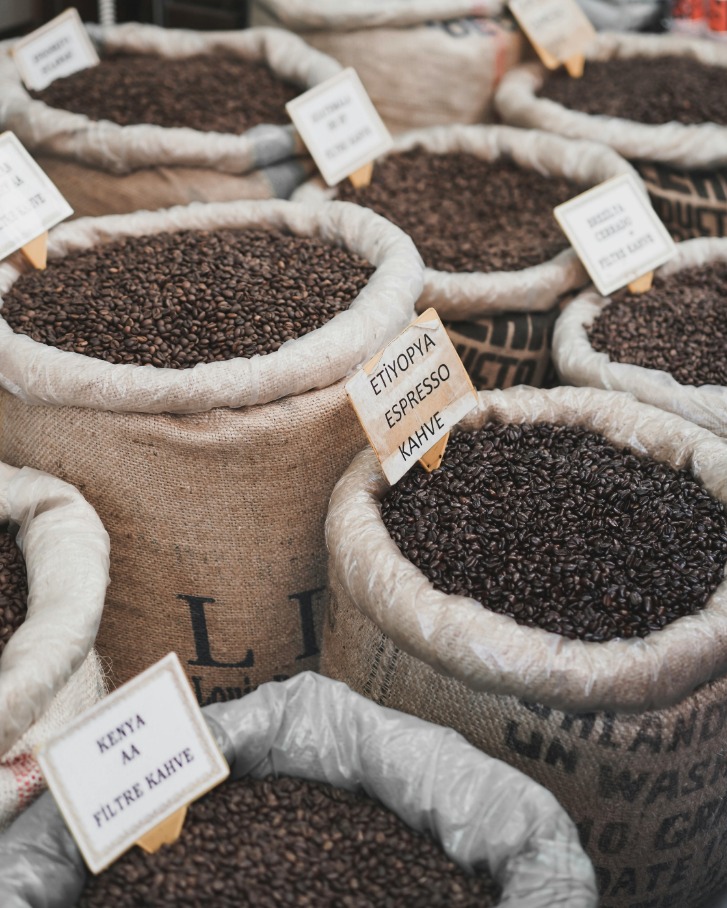Historical Background of Coffee in Kenya
Coffee in Kenya has a rich historical background that dates back to the early 20th century when it was first introduced by colonial settlers. Over the years, coffee cultivation expanded significantly, becoming a vital part of Kenya’s agricultural economy and a symbol of the country’s livelihood. The coffee industry haS evolved through various phases of development, influencing social and economic aspects of Kenyan society. Today, Kenyan coffee is renowned worldwide for its high quality and unique flavor profile, reflecting the country’s diverse climate and fertile highlands.
Origins and Early Adoption
The history of coffee in Kenya dates back to the early 20th century when the crop was first introduced by colonial administrators and settlers. Coffee was initially cultivated on small private farms before expanding with government initiatives aimed at boosting the economy. The origins of coffee in Kenya are linked to the introduction of Arabica coffee varieties, which thrived in the country’s high-altitude regions known for their favorable climate and volcanic soils. During the colonial period, coffee quickly gained popularity among local farmers and became a significant export commodity. The early adoption of coffee cultivation was driven by the desire to establish Kenya as a leading producer of high-quality Arabica beans, which laid the foundation for the country’s modern coffee industry. Over time, smallholder farmers embraced coffee as a lucrative crop, and it became an integral part of Kenya’s agricultural landscape and economic development.
Development During Colonial Period
During the colonial period, coffee cultivation in Kenya experienced significant development, shaping the country’s position as a major global coffee producer. The British colonial administration introduced coffee farming in the early 20th century as a lucrative crop to boost the economy and supply the British market.
- The British colonial government established large-scale coffee estates primarily owned by European settlers. These estates utilized Native African labor under oppressive conditions.
- Kenya’s favorable climatic and geographic conditions, such as high altitudes and volcanic soils, made it ideal for growing coffee and contributed to the crop’s success during this period.
- The establishment of coffee cooperatives and mills was promoted to streamline production and increase exports.
- Despite the initial exploitation, coffee became a vital source of income for Kenyan farmers and laid the groundwork for the country’s future as a leading coffee exporter.
- The colonial administration also implemented policies that structured the land use and ownership patterns, which have had lasting effects on coffee farming and land distribution in Kenya.
Post-Independence Growth and Changes
Coffee in Kenya has a rich historical background that dates back to the early 20th century when colonial administrators introduced coffee cultivation as a lucrative cash crop. Initially, it was cultivated primarily by European settlers and wealthy local farmers, benefiting from the favorable climate and fertile highlands. Over time, Kenyan coffee gained prominence due to its high quality and unique flavor profile, making it highly sought after in international markets.
Following Kenya’s independence in 1963, the coffee industry underwent significant changes aimed at promoting local participation and improving productivity. The government initiated reforms to support smallholder farmers, including establishing cooperatives and issuing better access to credit and extension services. These measures helped to diversify the sector and increase coffee production across the country.
During the post-independence era, there was a shift towards modernization and increased emphasis on quality control. The development of a national coffee research center and improved processing techniques contributed to the enhancement of Kenya’s coffee reputation. Additionally, the industry faced challenges such as fluctuating global prices and climate change, prompting efforts to diversify markets and adopt sustainable agricultural practices. Today, Kenyan coffee remains a symbol of the country’s agricultural heritage and continues to thrive as a key export commodity, with ongoing innovations to ensure its growth and sustainability in the global market.
Types of Coffee Grown in Kenya
Kenya is renowned worldwide for its high-quality coffee, which is a vital part of the country’s agricultural sector. The diverse climate and rich volcanic soil create ideal conditions for cultivating various types of coffee. From the iconic Arabica beans to specialty varieties, Kenya offers a range of coffee types that boast unique flavors and characteristics. Exploring the different kinds of coffee grown in Kenya provides insight into the rich heritage and vibrant coffee culture of the region.
Arabica Coffee Varieties
Kenya is renowned for its high-quality coffee, primarily grown in the rich, volcanic soils of the highland regions. The country’s coffee industry boasts a variety of types that contribute to its global reputation for excellence. Among these, Arabica coffee is the most prominent and widely cultivated variety in Kenya, known for its superior flavor profile and aromatic qualities.
Kenya predominantly produces Arabica coffee, specifically the Bourbon and SL28/SL34 varieties, which are celebrated for their bright acidity, full-bodied taste, and complex flavor notes. Bourbon Arabica, originally from Yemen, is favored for its sweet, fruity profile and smooth finish. SL28 and SL34 varieties, developed locally, are prized for their resilience to disease and ability to thrive in the Kenyan climate, producing beans with distinctive wine-like undertones and vibrant acidity.
Other coffee varieties grown in Kenya include Robusta, which is less common and mostly used for blending and instant coffee production. However, the focus remains on Arabica varieties due to their superior flavor and market demand. The unique climatic conditions and diverse altitudes across Kenyan coffee-growing regions contribute significantly to the distinct taste and quality of the Arabica coffee produced in the country.
Robusta Coffee Cultivation
Kenya is renowned for its high-quality coffee production, primarily focusing on Arabica varieties, which thrive in the country’s rich, volcanic soil and favorable climate. Aside from Arabica, Robusta coffee is also cultivated in Kenya, although to a lesser extent. Robusta, known for its strong flavor and higher caffeine content, is typically grown at lower altitudes compared to Arabica. Robusta coffee cultivation in Kenya is concentrated in regions such as Western Kenya and parts of the Rift Valley, where the warmer temperatures and the altitude provide suitable conditions for this variety. Farmers cultivating Robusta in Kenya often use traditional methods, and the coffee is valued for its robustness and distinctive taste profile. Overall, Kenyan coffee, including Robusta, contributes significantly to the country’s reputation as a top coffee producer globally.
Specialty and Specialty Demarcations
Kenya is renowned for its diverse types of coffee, primarily Arabica, which accounts for the majority of production due to its superior flavor profile. Arabica coffee in Kenya is characterized by its bright acidity, full-bodied taste, and complex flavor notes such as citrus, berry, and floral undertones. In addition, there is a smaller proportion of Robusta coffee cultivated in certain regions, offering a stronger, more robust flavor with higher caffeine content. Kenya’s coffee is cultivated mainly at high altitudes on volcanic soils, contributing to its distinctive quality and flavor.
Specialty coffee in Kenya refers to beans that meet the highest quality standards, often scoring 80 points or above on a 100-point scale by professional graders. These coffees are meticulously processed, usually through washed (malted) processing methods, which enhance clarity and brightness. Specialty coffee in Kenya is often traceable to specific estates or cooperatives, showcasing unique regional characteristics. The specialty demarcations include categories such as AA, AB, and PE (Prime Ethiopia), with AA being the highest grade, indicating larger bean size and superior quality. These demarcations help buyers distinguish and select premium Kenyan coffees that are prized worldwide for their consistency, aroma, and cup quality. Overall, Kenyan coffee’s reputation is built on its exceptional quality, with specialty coffee representing the pinnacle of its cultivation and processing standards.
Regions Known for Coffee Production
Kenya is renowned worldwide for its exceptional coffee production, which plays a vital role in the country’s economy and culture. The regions within Kenya that are dedicated to coffee cultivation are known for their high-quality beans, vibrant flavors, and picturesque landscapes. These areas benefit from ideal climatic conditions and rich volcanic soils, making them some of the most productive and celebrated coffee regions globally.
Central Kenya Region
The Central Kenya Region is renowned for its high-quality coffee production, playing a significant role in Kenya’s esteemed coffee industry. This region’s favorable climate, fertile slopes, and volcanic soil create ideal conditions for cultivating Arabica coffee beans, which are highly sought after worldwide. Farmers in Central Kenya often engage in traditional coffee farming methods, ensuring the beans develop rich flavors and unique profiles. The area’s coffee plantations contribute substantially to Kenya’s reputation for producing some of the world’s best gourmet coffees, characterized by bright acidity, full-bodied taste, and vibrant citrus notes.
Nyanza and Western Kenya
Kenya is renowned for its high-quality coffee, with regions like Nyanza and Western Kenya playing a significant role in its reputation. These areas have a favorable climate and rich volcanic soils that contribute to the distinct flavors and جودة of Kenyan coffee.
Eastern Kenya and the Highlands
Kenya is renowned for its high-quality coffee, with certain regions standing out for their exceptional production. Eastern Kenya and the Highlands are two major coffee growing areas that contribute significantly to the country’s reputation as a coffee producer. These regions benefit from ideal altitude, climate, and volcanic soils, which enhance the beans’ flavor and aroma. In Eastern Kenya, coffee farms are often situated on slopes and are known for producing beans with bright acidity and fruity notes. The Highlands, encompassing areas like Kiambu, Murang’a, and Kiambu, are characterized by rich soil and cooler temperatures, resulting in full-bodied coffee with complex flavors. These regions are vital to Kenya’s coffee industry, attracting buyers worldwide seeking distinctive and sought-after beans.
Agricultural Practices and Coffee Farming Techniques
Kenya is renowned for its high-quality coffee, cultivated through traditional and innovative agricultural practices that enhance flavor and sustainability. Coffee farming in Kenya involves meticulous techniques designed to optimize yield, quality, and environmental health. Understanding these methods provides insight into the nation’s prominent position in the global coffee market and the dedication of Kenyan farmers to producing exceptional coffee beans.
Modern Farming Methods
Coffee farming in Kenya is renowned for its high-quality beans and sustainable agricultural practices. Modern farming techniques have significantly improved yields and soil health, ensuring the long-term viability of coffee plantations. Kenyan farmers often adopt integrated pest management to reduce chemical use and promote eco-friendly environments. Precision agriculture tools, such as GPS-guided equipment and drone technology, help optimize resource application and monitor crop health. Additionally, shade-grown coffee practices are common to preserve biodiversity and maintain favorable microclimates for coffee plants. Training and education programs also play a vital role in disseminating innovative methods that enhance productivity and sustainability in Kenyan coffee farming.
Traditional Cultivation Practices
Coffee farming in Kenya is deeply rooted in traditional agricultural practices that have been passed down through generations. These methods emphasize sustainable cultivation, respecting local ecosystems while maximizing quality and yield. Kenyan coffee farmers often rely on age-old techniques that prioritize soil health, shade management, and careful harvesting to produce some of the world’s most acclaimed coffee beans.
- Selective Hand-Picking: Farmers carefully pick only ripe coffee cherries by hand to ensure high quality beans and reduce waste.
- Shade Growing: Coffee is cultivated under the natural canopy of indigenous trees, which provides shade, maintains moisture levels, and supports biodiversity.
- Intercropping: Farmers often plant coffee alongside crops like bananas and other fruit trees to diversify income and improve soil fertility through natural composting.
- Use of Organic Fertilizers: Traditional practices favor the use of organic compost and natural manure to enrich the soil without chemical inputs.
- Dry and Wet Processing: Depending on local conditions, farmers may use traditional dry or wet processing methods to prepare coffee beans for export, with an emphasis on preserving flavor and aroma.
Overall, Kenya’s traditional coffee cultivation techniques reflect a harmonious relationship with the environment, blending age-old wisdom with modern sustainable practices to produce high-quality coffee that is renowned worldwide.
Sustainable and Organic Farming
Coffee farming in Kenya is renowned for its high-quality beans and unique flavor profile, which is greatly influenced by sustainable and organic farming practices. Kenyan farmers often adopt environmentally friendly techniques that promote soil health, conserve water, and protect biodiversity, ensuring the long-term viability of their coffee plantations. Organic farming methods in Kenya emphasize the use of natural fertilizers such as compost and manure, reducing reliance on synthetic chemicals that can harm the environment and diminish coffee quality.
Additionally, many Kenyan coffee farmers implement shade-grown practices, cultivating coffee under a canopy of native trees that provide habitat for wildlife and help maintain ecological balance. This approach not only enhances coffee flavor but also mitigates soil erosion and preserves biodiversity. Precision farming techniques, including careful water management and integrated pest control, are increasingly adopted to increase yield and quality sustainably. Through these innovative and eco-conscious practices, Kenyan coffee farmers are able to produce premium coffee while safeguarding their environment for future generations.
Impact of Climate and Geography on Coffee Quality
Kenya’s unique climate and diverse geography play a vital role in shaping the exceptional quality of its coffee. The high-altitude regions, coupled with consistent rainfall and lush volcanic soils, create ideal conditions for cultivating rich and flavorsome beans. These environmental factors contribute to the distinctive taste profiles that make Kenyan coffee highly sought after worldwide.
Altitude and Temperature Effects
In Kenya, the impact of climate and geography on coffee quality is profound, especially concerning altitude and temperature. The country’s diverse topography creates ideal conditions for high-quality Arabica coffee, cultivated predominantly in mountainous regions. High altitudes, often above 1,200 meters, provide cooler temperatures that slow the maturation of coffee cherries, resulting in denser beans with more complex flavors. Cooler temperatures in these high-altitude areas enhance the development of aromatic compounds, contributing to Kenya’s renowned bright acidity and vibrant flavor profiles. Conversely, regions with lower altitudes tend to produce beans with milder flavor characteristics due to quicker ripening and less aromatic development. Overall, Kenya’s specific climate conditions and varied elevations significantly influence the distinctive and premium quality of its coffee, making it highly sought after in global markets.
Soil Types and Their Influence
Climate and geography play a crucial role in shaping the quality of coffee in Kenya. The country’s high-altitude regions with their cool temperatures and frequent rainfall create ideal conditions for coffee cultivation, resulting in beans with enhanced acidity and complex flavor profiles. The diverse topography, including volcanic hills and fertile slopes, contributes to the unique character of Kenyan coffee, making it highly sought after worldwide. Soil types also significantly influence coffee quality, with volcanic soils offering rich, mineral-laden nutrients that improve bean development and flavor complexity. These soils promote healthy plant growth and allow for the production of coffee with bright acidity, full body, and vibrant aroma, hallmark traits of Kenyan coffee. Overall, the interplay of Kenya’s climate, geography, and soil types underpins the distinctive quality that sets Kenyan coffee apart in the global market.
Rainfall Patterns and Harvest Cycles
The quality of coffee grown in Kenya is significantly influenced by the country’s unique climate and geographical features. The high-altitude regions with their cool temperatures foster slow bean maturation, which enhances flavor complexity and aroma. The tropical climate ensures consistent warmth and sunlight, vital for coffee plant development. Rainfall patterns play a crucial role in determining the timing and size of harvests, with well-distributed rainfall supporting healthy growth and periodic rainy seasons facilitating flowering and fruiting. Variations in rainfall and temperature across different regions lead to distinct flavor profiles, making Kenyan coffee highly sought after. Moreover, the specific geographic conditions such as volcanic soil richness contribute to the vibrant acidity and overall quality of the beans. These factors collectively shape the harvest cycles, enabling multiple picking seasons in certain areas and influencing the fermentation and processing methods used to preserve flavor integrity.
Processing Methods and Their Effect on Coffee Profiles
Processing methods play a vital role in shaping the unique flavor profiles of Kenyan coffee. Each method—from washed to natural and honey processing—imparts distinct characteristics that highlight the region’s diverse microclimates and cultivars. Understanding these techniques allows coffee enthusiasts to appreciate the complex flavors and aromas that define Kenyan coffee and enhances the overall tasting experience.
Washed (Wet) Processing
Washed (Wet) processing is a method commonly used in Kenya to produce high-quality coffee with bright acidity and a clean cup profile. This process involves removing the coffee cherry’s outer layers before fermentation, resulting in beans that retain their inherent fruity and floral flavors. In Kenya, the washed method highlights the region’s unique terroir by accentuating the vibrant citrus notes, wine-like qualities, and crispness that are characteristic of Kenyan coffee. The meticulous cleaning and fermentation stages in washed processing contribute to a consistent and well-defined flavor profile, making Kenyan washed coffees highly sought after by connoisseurs worldwide.
Natural (Dry) Processing
Natural (Dry) Processing is a traditional method commonly used in Kenya to enhance the unique flavor profiles of coffee beans. In this process, coffee cherries are sun-dried with the fruit still intact, allowing the beans to absorb the sugars and flavors from the fruit pulp. This method often results in a wine-like acidity, fruity notes, and a fuller body in the final cup. Kenyan coffees processed naturally tend to showcase bright, vibrant flavors with pronounced berry and tropical fruit characteristics. The natural processing method also imparts a distinct complexity, making these coffees highly sought after by connoisseurs. However, it requires careful handling to prevent mold and over-fermentation, which can negatively affect the coffee’s quality. Overall, natural processing in Kenya highlights the region’s dedication to crafting coffees with rich, fruity, and complex profiles that reflect the country’s diverse climate and high-altitude growing conditions.
Honey Processing
Honey processing is a popular method used in Kenya to produce unique coffee profiles that highlight the region’s rich flavors. This process involves removing the outer cherry layers but leaving a sticky mucilage on the bean, which is then dried. The retained honey mucilage influences the coffee’s sweetness, body, and complexity, often resulting in a vibrant cup with fruity and floral notes. Kenyan honey-processed coffees typically exhibit bright acidity and a well-balanced profile, making them favored among coffee enthusiasts. The method also allows for variations such as white, yellow, and red honey, each imparting distinct characteristics to the final brew. Overall, honey processing enhances the natural attributes of Kenyan coffee, emphasizing its renowned clarity and lively flavors.
Kenya’s Coffee Industry and Market Dynamics
Kenya’s coffee industry is a vital sector of the country’s economy, renowned worldwide for its high-quality beans and distinctive flavor profiles. The market dynamics within Kenya’s coffee sector are shaped by factors such as climatic conditions, farmer cooperatives, and global demand. As one of Africa’s leading coffee producers, Kenya continues to adapt to changing market trends, emphasizing quality, sustainability, and value addition to maintain its competitive edge on the international stage.
Major Coffee Exporters and Cooperatives
Kenya’s coffee industry is a vital sector of the country’s economy, renowned for producing high-quality Arabica beans that are sought after worldwide. The industry has traditionally been marked by vibrant cooperative societies and a well-organized export market, contributing significantly to rural livelihoods and national revenue. Market dynamics are influenced by global coffee prices, climate conditions, and local production levels, which can fluctuate due to environmental challenges and policy changes. Kenyan coffee is distinguished by its unique flavor profile, which often commands premium prices in international markets.
Major coffee exporters in Kenya include large state-approved importers and the Nairobi Coffee Exchange, which facilitates the sale and export of coffee among local farmers and international buyers. The Kenyan government and various organizations support the industry’s growth through certification schemes and quality control initiatives. Cooperatives play a crucial role by aggregating coffee from smallholder farmers, ensuring quality standards, and increasing bargaining power in the global marketplace. These cooperatives also promote sustainable farming practices and provide crucial support to farmers, fostering economic stability and growth in Kenya’s coffee sector.
Domestic Coffee Consumption Trends

Kenya’s coffee industry is a vital sector of the country’s agricultural economy, renowned for producing high-quality Arabica beans that are highly sought after in international markets. The industry has experienced various ups and downs due to fluctuating global prices, climate change, and evolving market demands. Domestic coffee consumption in Kenya, while historically limited compared to export focus, is gradually increasing as awareness of coffee’s health benefits and premium quality grows among consumers. This trend is supported by local cafes, specialty coffee shops, and a growing culture of coffee appreciation among young Kenyans. The domestic market also benefits from the rise of urbanization, which has led to more coffee drinking in cities and towns.
- Increasing popularity of specialty and premium coffee products within Kenya.
- Growth in urban coffee shops boosting local demand.
- Consumers seeking high-quality Arabica beans from local producers.
- Growing awareness of health benefits associated with coffee consumption.
- Development of coffee culture among younger generations.
- Challenges include limited affordability for some segments and competition from globally available beverages.
Global Market Position and Competitiveness
Kenya’s coffee industry is a vital sector of the country’s agricultural economy, renowned for producing high-quality Arabica beans that are highly sought after in the global market. The market dynamics within Kenya are driven by factors such as fluctuating global coffee prices, climatic conditions, and government policies aimed at enhancing industry sustainability. Kenyan coffee producers face challenges related to aging plantations, fluctuating export demands, and the need for modernization to boost competitiveness.
On the global stage, Kenya holds a significant position due to its reputation for producing premium, specialty coffees characterized by bright acidity and unique flavor profiles. The country actively competes in international markets through strict quality standards and innovative marketing strategies that emphasize its distinct coffee qualities. Kenya’s commitment to certification programs like Fairtrade and Rainforest Alliance has further enhanced its market appeal, positioning it as a sustainable and premium coffee supplier.
Overall, Kenya’s coffee industry benefits from its strong brand reputation and niche market positioning, but it must continuously adapt to global market fluctuations and technological advancements. Investing in improved infrastructure, value addition, and sustainable practices will be crucial for maintaining and enhancing Kenya’s competitiveness in the increasingly competitive global coffee market.
Challenges in Coffee Production in Kenya
Coffee production in Kenya faces numerous challenges that impact the quality and quantity of the harvest. Factors such as climate change, pests, and diseases threaten coffee farms across the country. Additionally, limitations in modern farming techniques and inadequate infrastructure hinder farmers’ ability to maximize their yields. Addressing these challenges is crucial for sustaining Kenya’s reputation as a prominent coffee producer worldwide.
Climate Change and Environmental Challenges
Kenya’s coffee industry faces significant challenges due to climate change and environmental issues. Rising temperatures and unpredictable weather patterns have led to irregular rainfall, affecting coffee flowering and fruiting cycles. This variability reduces yield and quality, making it difficult for farmers to plan and invest confidently. Additionally, prolonged droughts and increasing instances of extreme weather events such as floods damage coffee plantations and erode soil fertility. Deforestation surrounding coffee farms further exacerbates these problems by decreasing biodiversity and disrupting local water cycles. Pests and diseases like coffee borer beetles and coffee rust thrive in changing climates, posing additional threats to production. Overall, addressing these environmental challenges is crucial for sustaining Kenya’s renowned coffee industry and its economic importance in the country.
Price Fluctuations and Market Access
Kenya’s coffee industry faces numerous challenges that impact its overall productivity and profitability. One significant issue is the fluctuating global prices for coffee, which can cause instability for farmers and exporters alike. These price fluctuations are influenced by international market trends, weather conditions, and fluctuations in demand, making it difficult for producers to plan and invest confidently. Additionally, market access remains a critical challenge, as smallholder farmers often have limited access to international markets due to poor infrastructure, lack of bargaining power, and stringent export regulations. These obstacles hinder the ability of Kenyan coffee producers to maximize their earnings and expand their reach in global markets, ultimately affecting the sustainability of the coffee sector in the country.
Diseases and Pest Management

Kenyan coffee production faces several challenges related to diseases and pest management that threaten the quality and quantity of the crop. Fungal diseases such as Coffee Leaf Rust (Hemileia vastatrix) severely impact coffee plants by causing leaf defoliation and reducing yields. Additionally, Coffee Berry Disease (Colletotrichum kahawae) affects the coffee cherries, leading to increased waste and lower productivity. Pests like the Coffee borer beetle (Hypotenemus hampei) and coffee mealybugs also pose significant threats, damaging the beans and compromising quality. Managing these diseases and pests requires integrated pest management strategies, suitable resistant varieties, and proper farming practices. However, limited access to effective pesticides, inadequate extension services, and climate change complicate control efforts. Addressing these issues is vital for sustaining Kenya’s position as a leading coffee producer and ensuring the livelihoods of many farmers dependent on coffee cultivation.
Opportunities and Future Outlook for Kenyan Coffee
Kenyan coffee is renowned globally for its high quality and distinctive flavor, positioning the country as a significant player in the international coffee market. With a rich history and a reputation for excellence, Kenya’s coffee industry holds promising opportunities for growth and innovation. The future outlook is optimistic, driven by modern agricultural practices, government support, and increasing demand from premium coffee consumers worldwide. As the industry continues to evolve, Kenyan coffee is set to strengthen its presence and expand its reach in the global market.
Emergence of Specialty Coffee Markets
The future of Kenyan coffee presents promising opportunities, particularly through the emergence of specialty coffee markets. As consumers worldwide become more discerning and seek high-quality, ethically sourced coffee, Kenyan producers are well-positioned to capitalize on this trend by emphasizing unique flavor profiles and sustainable practices.
The specialty coffee segment allows Kenyan farmers to command higher prices and gain recognition for their premium beans, fostering better income and investment in quality improvement. Additionally, growing international demand for Kenyan AA, SL28, and SL34 varieties enhances the country’s reputation in the global coffee industry.
With advances in technology, improved processing methods, and stronger branding efforts, Kenyan coffee can diversify its markets and reach new consumers. Continued investments in infrastructure, quality assurance, and farmer training will further strengthen the sector’s competitiveness.
Overall, the emergence of specialty coffee markets offers a significant catalyst for growth, shaping a sustainable and profitable future for Kenyan coffee producers while boosting the country’s position as a leading coffee exporter on the global stage.
Innovations in Farming and Processing
Kenyan coffee presents a promising future driven by increasing global demand and a reputation for high-quality beans. The country’s unique climate and topography continue to favor coffee cultivation, offering opportunities for growth and export expansion. Innovations in farming and processing are playing a crucial role in enhancing productivity, quality, and sustainability. Modern techniques such as precision agriculture, improved seed varieties, and sustainable farming practices are being adopted to maximize yields and reduce environmental impact. Additionally, advancements in processing methods, including washing and fermentation techniques, are helping to elevate the flavor profile and meet international market standards. The Kenyan coffee sector is also embracing technology for better traceability and certification, which adds value and builds consumer confidence. Overall, with ongoing investments in innovation and adherence to sustainable practices, Kenyan coffee is poised for a vibrant future in the global market, benefiting farmers, exporters, and consumers alike.
Promotion of Eco-friendly and Fair Trade Practices
Kenyan coffee presents promising opportunities for growth and sustainability by emphasizing eco-friendly and fair trade practices. As global demand for ethically sourced products increases, Kenyan coffee producers can leverage certifications and sustainable farming methods to attract discerning consumers. The focus on environmentally friendly cultivation techniques not only helps preserve Kenya’s rich biodiversity but also enhances the quality and reputation of its coffee beans. Additionally, promoting fair trade practices ensures that farmers receive equitable prices, encouraging rural development and supporting local communities.
The future outlook for Kenyan coffee is optimistic, with potential expansion into new markets and increased investment in sustainable infrastructure. Government and industry efforts to adopt renewable energy, reduce pesticide use, and implement organic farming standards will further strengthen the sector’s sustainability. Collaborations with international fair trade organizations and marketing campaigns highlighting Kenya’s unique coffee flavors and ethical practices can boost exports. Overall, embracing eco-friendly and fair trade principles will position Kenyan coffee as a leading choice for consumers worldwide seeking quality and responsibility.





0 Comments